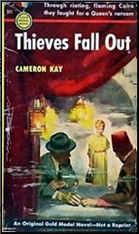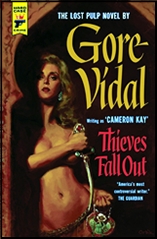Thu 16 Jun 2022
A Gold Medal Mystery Review by David Vineyard: [GORE VIDAL writing as] CAMERON KAY – Thieves Fall Out.
Posted by Steve under Reviews[9] Comments
CAMERON KAY – Thieves Fall Out. Gold Medal #311, paperback original, 1953. Hardcase Crime, paperback, April 2016.

It was when he came to pay for the cigarettes that he discovered he had been robbed.
If you ever wondered what a Casablanca-style Fawcett Gold Medal original (GM 311) novel by Gore Vidal might read like, Thieves Fall Out is your chance to find out.
The hero, who we meet when he wakes up in what appears to be a whorehouse (never stated), having been drugged and robbed on his first night in Cairo is Pete Wells, ex-roughneck, combat veteran, and recently deck hand on a freighter to pay his passage to Cairo, where he feels something will come his way because things are happening in post-war Cairo.
Like him getting rolled his first night ashore.
The American Consul is no help with his plight, but does find him a half decent room in a clean hotel and it is there he meets the bald, pink Englishman Hastings (An honest open face… with a grin concealing a larcenous soul…) who takes him to meet Countess Hèléne de Rastinac (“I always feel like spy when I sit in this room…â€), a beautiful woman who has an offer for him. It seems there is a certain relic that needs to be transported out of Cairo, not entirely legally, but it’s only a minor crime, and Wells could earn enough to help him out of his dilemma and then some by taking on the simple job.
Of course, nothing could possible go wrong…
It has to be pointed out that the world of thriller fiction would be seriously diminished if the protagonists had the common sense of a poodle.
Vidal was one of the enfant terrible of the literary scene. His work was almost always brilliant and often shocking to be shocking, spinning dizzyingly from the serious literary fictions like his war novel Williwaw and his controversial The City and the Pillar; to broad social satire like Myra Breckenridge written to shock for the sake of shocking; well-written historical novels like Julian, Burr , 1876, and Lincoln, prize winning plays like The Best Man; and as Edgar Box, a trio of sophisticated mystery novels modeled loosely on Mickey Spillane’s formula as Vidal saw it, featuring Public Relations man Peter Cutler Sargeant.

In addition he twice sought public office, became a political commentator, was outspoken about his sexuality and sex in general, and famously feuded with both William F. Buckley and Norman Mailer, both of which threatened him with violence and different points. His interests were catholic and you might find him waxing eloquent about American politics one day and writing nostalgically about Edgar Rice Burroughs and Tarzan in Esquire the next.
His long public career was marked by deliberate provocations of just about any sensibility he could manage as well as fascinating insights into the famous and infamous including his childhood friendship with Amelia Earhart. He was related to both Al Gore and John Dickson Carr among numerous other figures in American history, and impressed with almost none of them.
It’s little wonder one his best books was narrated by the infamous Vice President Aaron Burr who shot Alexander Hamilton in a duel and barely escaped with his neck in one of the most infamous plots in American history.
For much of the 20th Century following WW 2 it was simply impossible to avoid Gore Vidal even if you wanted to in American politics, culture, or letters.
For Pete Wells, his foray into foreign adventure starts with a bit of smuggling in a country where smuggling relics was virtually a national sport to revolution, arms trafficking, assassination, no little sex (though no more so than any other books of its kind), Nazi war criminals (there may have been a law at this point certain kinds of thrillers must have at least one), and just about any other trope of the novel of international intrigue and adventure of its time for good and ill.
At its best, like the evocative opening, it is immediate and puts you down in the middle of the action with almost cinematic grace. At its worst, it gets a bit lost at times in the attempts to evoke place and time and the characters, at least the two main ones, remain a bit too much Central Casting for the author’s own good, as if having got them in position, his literary instinct was at odds with the needs of an adventure story.
You can almost feel Vidal the literary figure being reined in by Vidal the pseudonymous writer looking for a paycheck and trying to color in the lines.
For the most part he does it pretty well.
Like Graham Greene’s long lost novel Name of the Action, Vidal kept it out of print in his lifetime. Like the Greene novel it is nowhere near that bad, but it does read as if it may have been written quickly for money, not exactly a flaw in the eyes of collectors of Gold Medal originals, whose very charm is sometimes that exact feeling of immediacy and energy.
Nor is Vidal alone in his sojourn into the original paperback with Gold Medal. Robert Wilder, Mackinley Kantor, Eric Hatch, Cornell Woolrich, and Vivian Connell alll ventured there as well, and not all only for a quick buck.
He plunged once more into the maze of streets, all deserted now. Not even lamplight shone in the narrow windows. The wooden balconies were empty. The passage of the mob had frightened even its own kind, and the people hid behind shutters in darkened rooms.
Evocative stuff, and the best of this not-bad thriller by a major literary figure slumming, but not embarrassing himself or his readers, and much more authentic than you might expect from the source.
June 16th, 2022 at 8:01 pm
Back in the day, pre-Internet, when the collecting of vintage paperbacks was at the height of it popularity, when it was revealed that Gore Vidal was the author of this otherwise fairly ordinary paperback, its price from dealers jumped from $5 to $50 overnight.
Or at least it did for dealers in the know. It took a while for all of them caught on. I remember talking to Bob Briney in one of the aisles of that year’s PulpCon, when all of a sudden he stopped, walked over to the nearest table and grabbed a copy from an unsuspecting dealer not in the know.
His price? A wonderful well-underpriced dollar. Luckily I already had a copy of my own, and nicer, or so I told myself, kicking myself for being so slow on the pickup.
June 16th, 2022 at 9:11 pm
“Fairly ordinary” is a fair description of the book and one of its virtues. Vidal could very easily have gone in the direction of parody of genre tropes and instead does a professional job of writing a decent Gold Medal original of the era.
I was thinking that it compared well to Stephen Becker’s Gold Medal novel and one or two other better known literary figures either starting there or passing through. None of them wrote an exceptionally good book for GM, but none wrote one that would embarrass themselves either.
Considering Vidal was capable of being both a great writer and a frivolous one he does a professional job here.
There is also an irony that his name is invariably mentioned, as I did above, in conjunction with Buckley and Mailer and both wrote genre novels themselves. It says something about the genre that three of the most famous literary figures of the Post War era all ended up writing genre fiction.
June 17th, 2022 at 9:25 am
This one is on Mt. TBR and I hope to get to it in a couple of months. My personal opinion is that Vidal’s first novel, WILLIWAW, was his best; I still remember the thrill I got from reading it over 50 years ago.
June 17th, 2022 at 10:35 am
I had to Google WILLIWAW, having never heard anything about it. Here’s a synopsis, courtesy of Amazon:
“A gripping tale of men struggling against nature and themselves, Williwaw was Gore Vidal’s first novel, written at nineteen when he was first mate of the U.S. Army freight supply ship stationed in the Aleutian Islands. Here he writes of a ship caught plying the lethal, frigid Arctic waters during storm season. Tensions run high among the edgy crew and uneasy passengers even before the cruel wind that gives the book its title suddenly sweeps down from the mountains. Vividly drawn characters and a compelling murder plot combine to make Williwaw a classic war novel. “
June 17th, 2022 at 9:40 am
Here’s my review from (gulp) 13 years ago. Where does the time go?
https://jamesreasoner.blogspot.com/2009/02/forgotten-books-thieves-fall-out.html
June 17th, 2022 at 10:32 am
Thanks, James. I see that you paid four dollars for your copy back then. A good investment! The lowest on ABE right now is still right up there at $127.40.
Luckily, though, for anyone tempted by your review or David’s, the Hard Case Crime edition goes for far less!
June 17th, 2022 at 12:57 pm
Had a chuckle from James’s review: “Gore Vidal is no Day Keene or Harry Whittington”. That, my friends, is a quote from a man who knows what he’s talking about and has no fear of derision from the hoity-toity; who has read the pulps without shame; and who has realized that of all of the things we are idiomatically scolded that we ought not judge by their cover–for the love of all that is good in this world–how about books!!!
June 17th, 2022 at 8:24 pm
Tony,
Agreed, Vidal doesn’t write a GM novel half as well as a Rabe, Marlowe (either of them), a Prather, or any of the old pros who were the lines backbone.
But he doesn’t embarrass himself either, and believe me, the author of MYRA BRECKINRIDGE and MYRON could easily have.
Steve,
WILLIWAW is a fine novel, a young man’s novel, but probably his most naturalistic work. There are several of his works I hold in high regard, particularly his historical novels, but his restless nature means he is often uneven. You never know what you will get.
August 4th, 2022 at 10:48 pm
Vidal is a chimera as much as Mailer or Buckley were. Add a dash of Tennessee Williams and John Gielgud. All intellectual men; but I suspect all were the same type of difficult personalities as was Klaus Kinsky. Fractious; sandpaper and burlap.
To me, Vidal is a kind of Pee-Wee Herman type guy who gets carried away with himself whenever he has the slightest chance. Like Mailer, or Algren –he doesn’t seem to grasp “the better part of valor”. His insight is slashing, towards anyone except himself.
Vidal’s feud with Charlton Heston, goes a long way in forming my picture of him. I direct your attention to it by way of illustration. Neither man shows up very well.
https://www.latimes.com/entertainment/movies/la-xpm-2012-aug-01-la-et-mn-gore-vidal-charlton-heston-ben-hur-20120801-story.html
https://www.slashfilm.com/795353/why-ben-hur-sparked-a-public-feud-between-charlton-heston-and-gore-vidal/